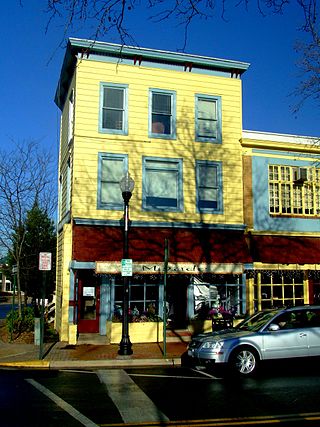
Configuration management (CM) is a systems engineering process for establishing and maintaining consistency of a product's performance, functional, and physical attributes with its requirements, design, and operational information throughout its life. The CM process is widely used by military engineering organizations to manage changes throughout the system lifecycle of complex systems, such as weapon systems, military vehicles, and information systems. Outside the military, the CM process is also used with IT service management as defined by ITIL, and with other domain models in the civil engineering and other industrial engineering segments such as roads, bridges, canals, dams, and buildings.
This aims to be a complete list of the articles on real estate.

Renting, also known as hiring or letting, is an agreement where a payment is made for the use of a good, service or property owned by another over a fixed period of time. To maintain such an agreement, a rental agreement is signed to establish the roles and expectations of both the tenant and landlord. There are many different types of leases. The type and terms of a lease are decided by the landlord and agreed upon by the renting tenant.

The United States Department of State Bureau of Overseas Buildings Operations (OBO) is responsible for overseeing the construction, management, and operations of U.S. diplomatic facilities around the world.

A lease is a contractual arrangement calling for the user to pay the owner for the use of an asset. Property, buildings and vehicles are common assets that are leased. Industrial or business equipment are also leased. Basically a lease agreement is a contract between two parties: the lessor and the lessee. The lessor is the legal owner of the asset, while the lessee obtains the right to use the asset in return for regular rental payments. The lessee also agrees to abide by various conditions regarding their use of the property or equipment. For example, a person leasing a car may agree to the condition that the car will only be used for personal use.

An operating expense is an ongoing cost for running a product, business, or system. Its counterpart, a capital expenditure (capex), is the cost of developing or providing non-consumable parts for the product or system. For example, the purchase of a photocopier involves capex, and the annual paper, toner, power and maintenance costs represents opex. For larger systems like businesses, opex may also include the cost of workers and facility expenses such as rent and utilities.
Property management is the operation, control, maintenance, and oversight of real estate and physical property. This can include residential, commercial, and land real estate. Management indicates the need for real estate to be cared for and monitored, with accountability for and attention to its useful life and condition. This is much akin to the role of management in any business.
A property manager or estate manager is a person or firm charged with operating a real estate property for a fee. The property may be individual title owned or owned under the sectional title, share block company owned, and may be registered for residential, commercial office, and retail or industrial use. In 2006, the Bureau of Labor Statistics Office of Occupational Statistics reported that there were 329,000 property managers employed in the United States, with the number expected to grow to by 50,000 by 2016.
A rental agreement is a contract of rental, usually written, between the owner of a property and a renter who desires to have temporary possession of the property; it is distinguished from a lease, which is more typically for a fixed term. As a minimum, the agreement identifies the parties, the property, the term of the rental, and the amount of rent for the term. The owner of the property may be referred to as the lessor and the renter as the lessee.

Commercial property, also called commercial real estate, investment property or income property, is real estate intended to generate a profit, either from capital gains or rental income. Commercial property includes office buildings, medical centers, hotels, malls, retail stores, multifamily housing buildings, farm land, warehouses, and garages. In many U.S. states, residential property containing more than a certain number of units qualifies as commercial property for borrowing and tax purposes.
Asset management is a systematic approach to the governance and realization of all value for which a group or entity is responsible. It may apply both to tangible assets and to intangible assets. Asset management is a systematic process of developing, operating, maintaining, upgrading, and disposing of assets in the most cost-effective manner.
Leaseback, short for "sale-and-leaseback", is a financial transaction in which one sells an asset and leases it back for the long term; therefore, one continues to be able to use the asset but no longer owns it. The transaction is generally done for fixed assets, notably real estate, as well as for durable and capital goods such as airplanes and trains. The concept can also be applied by national governments to territorial assets; prior to the Falklands War, the government of the United Kingdom proposed a leaseback arrangement whereby the Falklands Islands would be transferred to Argentina, with a 99-year leaseback period, and a similar arrangement, also for 99 years, had been in place prior to the handover of Hong Kong to mainland China. Leaseback arrangements are usually employed because they confer financing, accounting or taxation benefits.
The rental industry spans many different types of equipment from tools to heavy construction equipment, aerial to vehicles, party and event to computers and test and measurement equipment and highly specialized areas such as Crane and Temporary Accommodation rental. In the UK and some parts of Europe it is referred to as the Hire Industry.
An integrated workplace management system (IWMS) is an ultimate software platform for organizational uses of workplace resources, including the management of real estate portfolio, infrastructure and facilities assets of a company. IWMS solutions are commonly packaged as an integrated suite or as individual modules that can be scaled over time. They are used by corporate occupiers, real estate services firms, facilities services providers, landlords and managing agents. Traditionally focused on supporting real estate and facilities professionals, IWMS solutions are becoming more employee-oriented, expanding their focus to include all building occupants and visitors.
Property Management Systems (PMS) or Hotel Operating System (HOS), under business, terms may be used in real estate, manufacturing, logistics, intellectual property, government, or hospitality accommodation management. They are computerized systems that facilitate the management of properties, personal property, equipment, including maintenance, legalities and personnel all through a single piece of software. They replaced old-fashioned, paper-based methods that tended to be both cumbersome and inefficient. They are often deployed as client/server configurations. Today, most next-generation property management systems favor a software as a service (SaaS) model sustained by web and cloud technologies.

Bundesimmobiliengesellschaft m.b.H or BIG is a quasi-governmental company in Austria, which manages Austrian publicly owned real estate. BIG is the central provider of space for several public sector functions such as schools, universities, prisons, courts and police stations. It rents out buildings to the government entities using them, carries out renovations and new investments, and handles sales of buildings and land no longer in use by the public sector.
The Institute for Federal Real Estate is a government agency in Germany that provides federal government entities with real estate services. It functions as a landlord in the government system of internal rent—a commercially based model for managing government real estate. The institute provides services such as renting space, facility management and real estate development. The institute itself owns a major proportion of the property it manages, and is one of the largest owners of real estate in Germany. It was estimated that within 2011, the Institute for Federal Real Estate would—due to property transfers—own and manage nearly all real estate used by the federal government of Germany.
Corporate real estate is the real property held or used by a business enterprise or organization for its own operational purposes. A corporate real estate portfolio typically includes a corporate headquarters and a number of branch offices, and perhaps also various manufacturing and retail sites.
In commercial real estate leases in the United States, the landlord, rather than the tenant, is usually responsible for real estate taxes, maintenance, and insurance. In a "net lease", in addition to base rent, the tenant or lessee is responsible for paying some or all of the recoverable expenses related to real-estate ownership. As the rent collected under a net lease is "net" after expenses are passed through to tenants to be paid, the rent tends to be lower than rent charged under a "gross lease".

A retail lease is a legal document outlining the terms under which one party agrees to rent property from another party. A lease guarantees the lessee use of an asset and guarantees the lessor regular payments from the lessee for a specified number of months or years. Both the lessee and the lessor must uphold the terms of the contract for the lease to remain valid.






